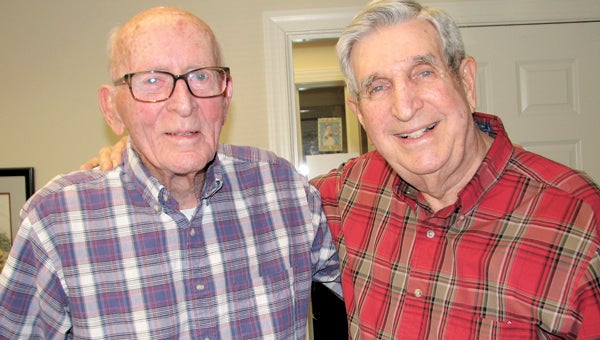Veterans recall Pearl Harbor
Published 10:05 pm Thursday, December 6, 2012

Fred Appleton, left, and Herbert Horst, both World War II veterans, spent part of Thursday remembering the months and years after the Japanese attack on Pearl Harbor, when both were engaged in fighting in the Pacific Theater. Friday is the 71st anniversary of the attack.
As they approached the 71st anniversary of the event that spurred the United States to enter World War II, a couple of servicemen spent part of Thursday reflecting on the events that followed the Japanese attack on Pearl Harbor.
Not only did the events of Dec. 7, 1941, cause the United States to get involved in the war, but also they were the impetus for Fred Appleton, now 92, to join up.
Appleton was in college on the day that would live in infamy. He signed up during his Christmas break.
“I was ready to go,” said the Lake Prince Woods resident. “My father wanted to see me go, too.”
Appleton explained his father was a veteran of the First World War who encouraged his son to follow in his footsteps.
Appleton joined the Navy and became an aviator, flying attack and rescue missions in the Pacific Theater for about two years as part of the U.S. military’s “island-hopping” campaign that advanced across the ocean toward Japan. He tells harrowing tales of attacks that didn’t go as planned, like the one on the Gilbert Islands.
“It was a disaster,” he said. “It was terrible. Marines were drowning. When I was landing, it was all I could do to avoid bodies in the water. We learned a lot, and we didn’t make some of the mistakes again.”
A more successful mission for Appleton was when he single-handedly rescued two aviators whose plane had been brought down in the water.
On the way to the location, “I was really praying that we’d find them and be able to get them,” he said.
He spotted the two men floating on a raft and, missing warnings to stay at altitude until enemy fire subsided, flew the plane down to get them.
After landing on the water, Appleton had to jump out of the cockpit and try to grab the men’s hands as bullets and shrapnel rained down around the plane. He made contact on the first pass, but the man’s burned and wet hand slipped out of his grasp.
On a second attempt, Appleton got closer and rescued both men. Another plane rescued the pilot of the downed aircraft, and all three men survived.
After two years in the Pacific, Appleton was reassigned to fighter training in October 1944. One day, his commanders told him there would be no training missions that day, and the aviators learned later an atomic bomb had been dropped in Japan, effectively ending the war.
“It was perfect timing to get back to college,” Appleton said. He went on to work for the telephone company and would serve his country again during the Korean War.
“So much happened in that time,” he said. “It was a full experience.”
Herbert Horst, now 88 and also a resident of Lake Prince Woods, knows Appleton’s stories well.
The two men have spent many hours remembering the war, having seen combat on many of the same Pacific islands. Horst, too, has his own tales of horror.
Serving with the Army Air Corps, he once went into a flat spin and crash-landed while training. In a separate incident, he “spent three days in a scooped-out hole with about half a dozen Marines” on Iwo Jima.
But his tales didn’t compare to those of his comrades who were captured by the Japanese, he said.
“We didn’t know what was happening to them,” Horst said. “We found out later. We knew they could be very cruel.”
Horst also left the military after the war. His family hosted a Japanese exchange student in 1968, and he also lived in Tokyo for two years as part of his job with DuPont.
“I’ve spent a lot of time reconciling the behavior of the Japanese military during the war with (the people I’ve known),” he said. “I’ve spent a lot of time reading, trying to reconcile that.”






